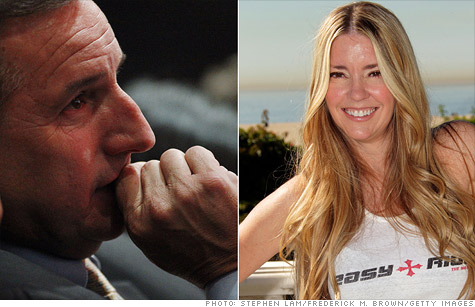Search News

NEW YORK (CNNMoney) -- The lurid, accusatory letter that led to last year's downfall of Mark Hurd as Hewlett-Packard's CEO has been made public.
The Delaware Supreme Court ruled Wednesday that the letter be released, despite Hurd's wishes. The court did not actually release the letter, but it was obtained by several news agencies.
The eight-page account, written in June 2010 by celebrity lawyer Gloria Allred, depicts in detail a story of Hurd repeatedly soliciting sex from Jodie Fisher, a greeter at HP (HPQ, Fortune 500) events and former reality TV star.
The letter claims that over the course of two years, Hurd pushed Fisher to meet him for dinner, give him hugs, sleep in his room and have sex with him, despite her continuous rejections of his advances.
Fisher said in a statement last year that the letter contained "many inaccuracies," and she noted that she believed Hurd's behavior was not "detrimental to HP."
Nevertheless, the scandal eventually led to Hurd's ouster from HP. Hurd privately settled Fisher's charges, which alleged sexual harassment. Though the company's board said its own investigation found no evidence of sexual harassment, it noted that Hurd inappropriately used company funds to take Fisher to dinner at non-HP events. Hurd is now president of Oracle (ORCL, Fortune 500).
A spokesman for Mark Hurd was not immediately available for comment.
According to the letter, events began to unfold in August 2007, when Hurd's program manager Caprice Fimbres suggested that a reality star from the NBC show "Age of Love" be made host of several executive events that Hurd was to attend. Hurd, who is married, flew from Palo Alto to Santa Monica, Calif., to meet Fisher personally, though the 45-minute conversation was primarily personal in nature, according to the letter.
The two met again the following month in what "felt more like a date," Fisher recalled, and she was hired in October to attend an event at the Atlanta Ritz Carlton. Following the event, the letter says Hurd and Fisher had dinner together, and Hurd asked Fisher to come to his room to see some documents about Madame Wu Yi, the Chinese Vice-Premier, whom Hurd was to meet the next day.
Hurd fondled Fisher and asked her to stay the night, a proposition which she rejected. A "clearly miffed" Hurd said he was never rejected, and he demanded at least a hug.
Fisher and Hurd continued to meet for dinner -- charged to HP -- before or after events, according to the letter. It says Hurd continued to woo her, including by telling her about the various women he has slept with. He also noted that many women were "crazy about him," including singer Sheryl Crow.
Using his status and wealth to woo Fisher, the letter accuses Hurd of bullying her into an unwanted relationship. Hurd often called Fisher in her room to talk about personal and business matters -- including revealing that HP was about to purchase services giant EDS, which the company eventually did buy in May 2008 for nearly $14 billion.
If true, it's possible that Hurd illegally leaked insider information. The letter accuses Hurd of instructing Fisher not to disclose anything about the deal "as it would be considered insider trading" if Fisher bought stock in EDS as a result.
In one noteworthy advance that took place in July 2009, the letter says Hurd urged Fisher to "go away with him," and he offered her "anything she needed." Hurd told her that he believed he wanted to spend the rest of his life with her, but "would have to see how the chemistry in bed was."
Fisher declined the sex, the money and the trip.
Hurd allegedly made one last attempt to win Fisher over. In October 2009, in Boise, Idaho, Hurd "grabbed and kissed" her. Fisher said she was feeling ill and left for her room. Her contract was not renewed, and she never saw or heard from Hurd again.
The letter was supposed to remain confidential as part of Hurd's settlement with Fisher. But Ernesto Espinoza, an HP shareholder, sued to make the letter public. He argued that stockholders should be able to determine for themselves whether Hurd's $12 million severance package was appropriate, given that the allegations of wrongdoing may have voided his right to severance.
Hurd fought to keep the letter private, but the Delaware Supreme Court ruled that the "mildly embarrassing" letter was not subject to the same privacy laws that governed trade secrets. ![]()